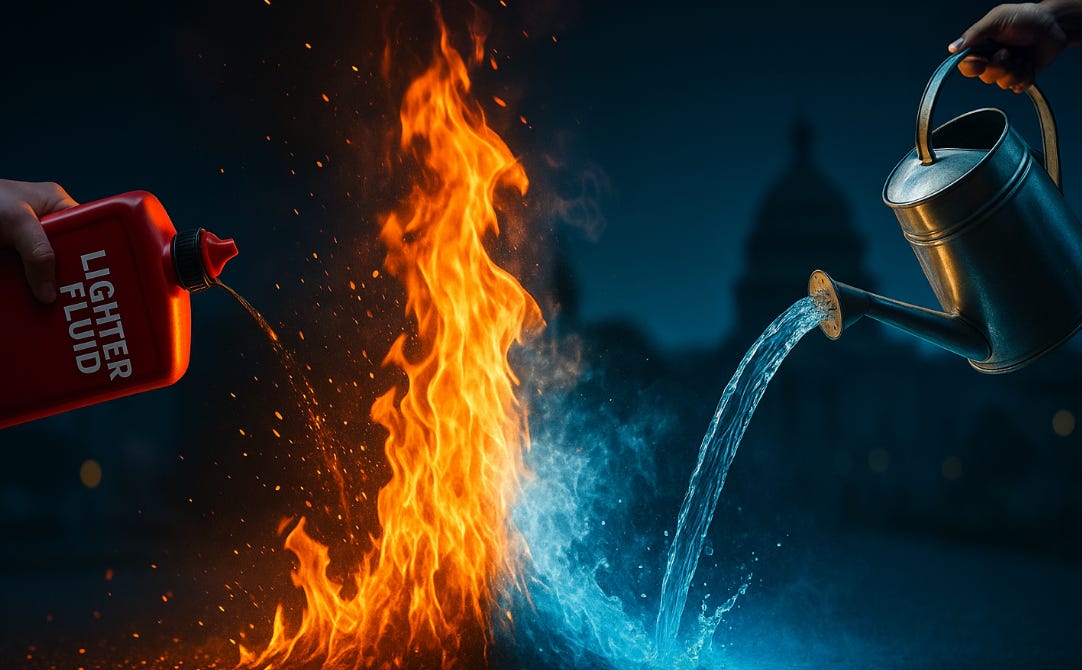What happened in Utah today — shots fired at a campus event, a political figure assassinated, a suspect still at large — left a wound on our nation that no argument can fill.
I didn’t agree with Charlie Kirk on most things, but I can admire that he was clearly a gifted organizer and leader who stepped into the political arena with courage. The violence we saw today is not new and does not discriminate by party. And each time it happens, many good people who would make good leaders calculate that standing up and standing out just isn’t worth the risk.
Moments like this can cool a country down or blow it apart. That choice doesn’t belong to extremists on the left or right alone. It belongs to the rest of us, the vast majority who still believe neighbors are more than avatars and that elections are how we settle things.
There will always be voices on the edges calling everything a holy war: good vs. evil, annihilate or be annihilated. They’re loud, and they’re skilled at baiting us into rage. But they do not have to win the day — or our future, or our kids’ futures. There’s more good than bad on the right and on the left. I’ve seen it. You probably have, too, both in the wake of tragedies that are historic and more intimate ones strangers will never know.
This is the time for good people across the political spectrum to lower the temperature. It is never too late, and I encourage grace for anyone whose wake-up call may have arrived later than yours. Here are some commitments we each can make to help:
1) No applause for bloodshed. No caveats, no “he reaped what he sowed” or “he was fine with kids dying.” That “but” is how we talk ourselves into dehumanization.
2) Refuse the dopamine. Don’t share the clip. Don’t amplify taunts or revenge fantasies. Don’t turn a killer into a celebrity. Let investigations do their work; don’t become a rumor mill.
3) Watch your verbs. “Crush,” “destroy,” “traitor,” “vermin” — words like these are accelerants. Strong arguments don’t need them. Use the language of persuasion, not elimination.
4) Protect the square. We should all be able to learn, speak, worship, and organize without looking for exits. That means supporting sensible security at public events, credible threat-assessment, and gun safety measures rooted in evidence, not talking points.
5) Lead where you are. If you have a microphone — whether it’s a podcast, pulpit, classroom, newsroom, group chat — model conflict without contempt. When you see your own side dehumanizing, say so. It matters most then.
This isn’t abstract. Political violence is contagious, and it’s been spreading: a kidnapping plot against Michigan’s governor; an attack on the U.S. Capitol that cost lives; pipe bombs left outside the RNC and DNC; the break-in and hammer attack that put Paul Pelosi in the ICU; an arson attack at the Pennsylvania Governor’s Residence while the First Family slept; multiple assassination attempts against Donald Trump; the killings of state legislators and their spouses in Minnesota; and now the assassination of Charlie Kirk in Utah.
None of that is normal in a healthy republic.
None of it is inevitable in a free one.
I don’t want a politics where children learn that a father’s death is an acceptable price for a policy view. I don’t want public squares that feel like combat zones. I want a politics that is loud, spirited, occasionally exhausting — and safe. You can be ruthless about ideas without being cruel about people.
So here is the choice, as plain as I can say it: When the temperature spikes, each of us can be water or we can be lighter fluid.
Water looks like restraint when rage would feel good or feels due. It looks like calling out your own side when they cross a line. It looks like supporting reforms that reduce the odds of the next vigil and the next empty chair at somebody’s table. Lighter fluid is the instant gratification of contempt and the momentum of rumor. It burns hot and leaves nothing but a hellscape to live in.
We shouldn’t have to live like this. And we don’t have to. The temperature comes down when enough of us decide to turn toward each other, not on each other.
I’m choosing water. I hope you will, too.



Extremely well said. Couldn’t agree more. We need to grow past this dangerous time in our country’s politics.
Unfortunately we live at a time in history where violence is being exacerbated and even encouraged.
If you do things to support violence in the world, especially in your own government, you are going to be a victim if that violence.
We have to have representatives who are going to stand up and declare without a doubt that enough is enough.
We used to have intelligent thoughtful debate in this country.
We now are so divided that any kind of civil discourse is almost impossible.
THAT is why this kind of violence occurred and will most likely continue.
This isn’t America getting great. It’s the exact opposite.